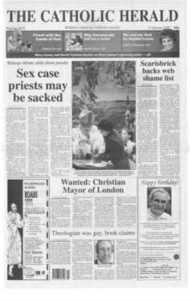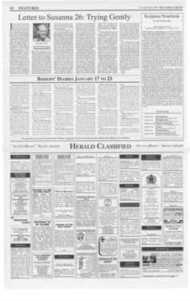Page 6, 15th January 1999
Page 6

Report an error
Noticed an error on this page?If you've noticed an error in this article please click here to report it.
Tags
Share
Related articles
Watch Out, Here
Why Is It So Hard To Be Funny On Television?
From Our Critics
What Not To Watch This Christmas
Unlimited Vengeance Does No One Any Favours
Welcome back Father Ted
Media Matter
NICK THOMAS
IT IS NO SECRET that the TV networks run repeats principally to save money, but the often-used line "another chance to see" need not be entirely disingenuous. Sometimes you need another chance, especially when the advance publicity for something particularly good had the effect of putting you off. That was why I missed the first series of Father Ted, currently running again on Channel 4. The original trailers were completely misleading, promising nothing but infantile vulgarity in an impenetrably alien setting. So when I eventually caught up with the show, half way through series two, I was hopping mad with the channel for trying to grab a mass audience of morons instead of alerting the discerning public to the imminence of a rare treat.
For Father Ted was golden comedy. Not everyone's cup of tea, to be sure — for some reason my friends of Irish extraction found it utterly unfunny. But it was hard to fault for casting, timing, or the relentless inventiveness of its scripts. There were more comic conceits in one episode than in the whole series of The Vicar of Dibley.
There are people, of course, who find the whole concept offensive, but to them I would offer cautious and respectful argument. Priests are human beings, after all, and therefore as legitimately vulnerable to satire as anyone else. Ted never lampooned Christian faith, or even the doctrines of the Catholic Church. Half the time the comedy was not about the priesthood, but when it was it addressed the petty vanities and jealousies of tiny fish in tiny ponds, the risible frustrations of life in the middle of nowhere. Ireland itself took a fair few knocks, but presumably the Irish have got the right to make fun of themselves, then sell the results to Channel 4. But the last in a long list of things Father Ted got right was finishing when it did, though whether this would have been true but for the untimelydeath of its star, Dermot Morgan, is poignantly unclear. I hope so, because the three series were just about perfect, and make a tidy collectors' item along with Fawlty Towers (two series) and A Very Peculiar Practice (two series of five).
These days it is hard to believe, let alone remember, that the first season of Last of the Summer Wine was not just brilliantly funny, but written to a literary standard worthy of the old Armchair Theatre. Roy Clarke's dialogue is still distinctively oblique, but the acute social observation and dramatic pacing drained away long ago, to be replaced by formulaic slapstick silliness. The same thing happened to another good writer, Simon Nye; a victim of its own success, Men Behaving Badly should have finished after series two. Even Absolutely Fabulous ran out of ideas half way through the first episode of its third series, much to the chagrin of Saunders and Lumley fans.
All of these shows, of course, were British, but you can't beat the Yanks when it comes to flogging dead horses. American shows, however, offer two unmissable warning signs that they have reached the end of their natural lives. One is the introduction of celebrity cameos which add nothing to the plot, but just enhance the programme's status as an institution — surely the kiss of death for any comedy.
The other is the appearance of what our cousins stateside call "heart", moments of sentimental drama which betray like nothing else the certainty that the gags are dryingup. Friends, Cheers, The Golden Girls — all the longestrunning American comedies of recent times have slithered into mediocrity by one or both of these routes.
So the networks should learn that in comedy, as in so much else, less means more. Let us have more Father Teds, little three-season gems that leave us wanting. We will always be grateful for the repeats. And they're cheaper to broadcast, too.
blog comments powered by Disqus













